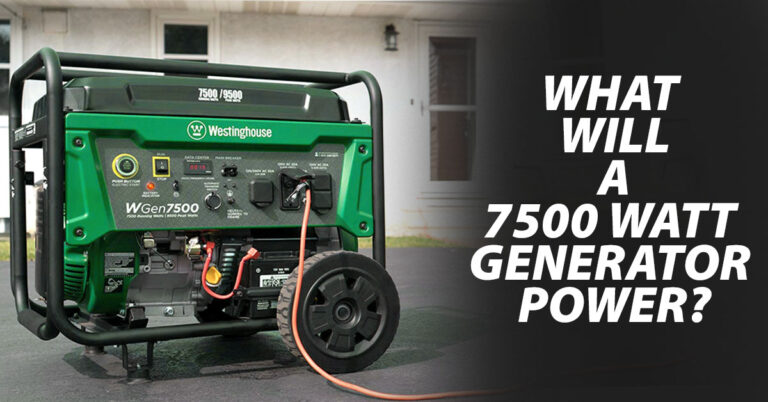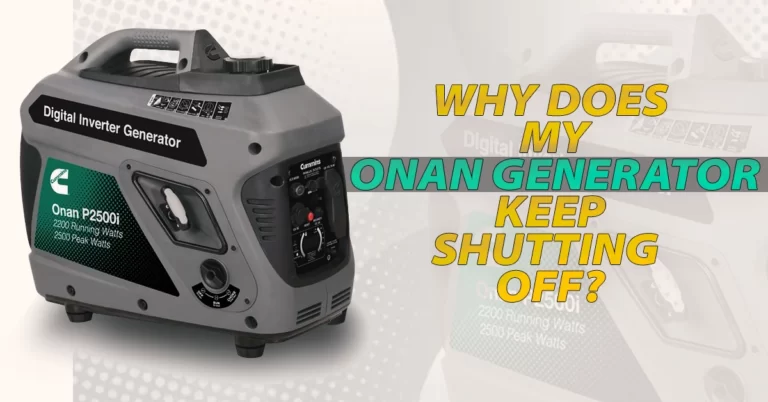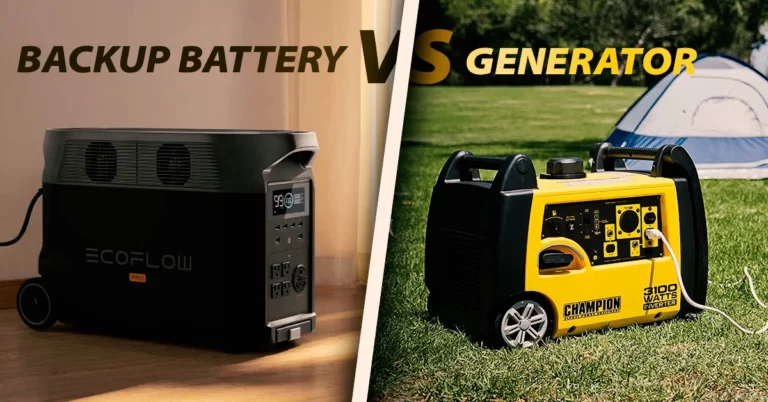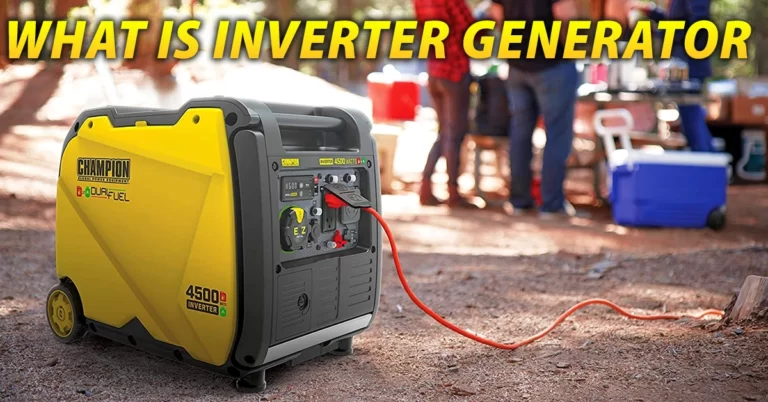How To Choose The Best Solar Generator For Your RV?
Are you passionate about RVs? When it comes to long-distance travel, having the best solar generator for your RV can be incredibly useful. This post explores essential factors like battery capacity, charging capabilities, inverter rating and type, budget considerations, size, warranty, and more to guide you in choosing the ideal solar generator for your RV needs. Additionally, we review three top solar generator stations to assist you further in your RV adventures. So, read on for detailed insights and answers to common questions in this comprehensive buying guide on “How To Choose The Best Solar Generator For Your RV?”
The Best Solar Generators for RVs: How to Choose
It’s crucial to think about how to choose the best solar generator for your RV, taking into account many crucial elements, as given below, while choosing the ideal solar generator for your RV excursions, including camping, travel trailers, and tailgating:
Battery Capacity
Battery capacity is a crucial factor when choosing a solar generator for your RV. The ideal capacity depends on your RV’s energy needs and charging frequency. Aim for a generator with 50% more capacity than your daily requirement for backup. Keep in mind that higher capacity entails greater expense. Calculate your RV’s energy needs precisely, considering factors like LED bulbs (7-10W), laptops (54W), or air conditioners (2000W). A typical solar generator like Infinity 1500 has a 1512Wh capacity. Large RVs can need up to 20 kWh daily, while small vans may require as little as 3 kWh. Your generator should match your specific energy needs.
Charging and Charge Cycle
A solar generator’s multiple charge cycles refer to how many times it can fully charge and discharge before the battery starts losing capacity or failing. A reliable larger solar generator should offer 2000 or more charge cycles for long-lasting performance. Having various charging options, such as campgrounds, EV stations, and solar panels, provides flexibility. For solar-only charging, consider your RV’s energy consumption realistically. RVs that consume a lot of energy could need a solar power system like EcoFlow’s Power Kits.
Quick Recharging
Having a solar generator that charges quickly is super important for RVs. Why? Because when you’re on an RV trip, you use a lot of things that need electricity, and that can drain your power. A fast-charging solar generator can fill up its power during the day, so you have enough for the evening and night. When you can’t access the standard power grid, this is extremely useful.
Inverter Rating & Type
When choosing an RV solar generator, inverter rating and type are vital. Inverters convert battery DC power to 120-volt AC power. Key considerations:
Inverter Ratings
Continuous Rating: This tells you how many watts of AC power the inverter can produce steadily for an extended period. It can range from 100 watts to over 3,000 watts.
Surge Rating: Surge output refers to the inverter’s ability to deliver a brief burst of power, typically for a few seconds. Appliances like refrigerators and power tools need this extra power during startup.
Choosing the Right Wattage
Select a solar generator that can produce the required amount of power (in watts) for the 120-volt appliances you plan to use, including handling startup surges. You can find this wattage requirement on the appliance or in its user manual.
Inverter Types
Pure Sine Wave: This type produces high-quality AC power similar to what your home’s power outlet provides. It’s ideal for sensitive electronic devices.
Modified Sine Wave: This type generates lower-quality AC power suitable for basic electrical devices like power tools. Computers and other contemporary equipment might not be able to be powered by it.
Efficient Operation
Running a generator at 100% output is not recommended as it can quickly drain the batteries. It’s better to operate at 50% output for efficiency and prolonged operation. If you plan to power all your appliances, consider doubling your power needs estimate to maintain efficiency.
Additionally, choosing a solar generator with a high-quality pure sine wave inverter is advisable as it provides clean and stable power, safeguarding your devices from voltage fluctuations and potential damage.
Solar Input Capability
When you’re picking a generator, look at its “solar input capability.” This tells you how fast you can charge it with solar panels. If it has a higher number, it can charge because you can connect more solar panels. But remember, extra panels can make it more expensive.
Battery Chemistry
Battery chemistry plays a crucial role in the performance of solar generators, and the majority of modern solar generators use lithium-ion batteries for several compelling reasons:
- Compared to more traditional battery types like lead-acid batteries, lithium-ion batteries, which serve as power banks, can store a significant amount of energy in small, light containers.
- They can maintain their charge without needing a trickle charger when not in use.
- Since lithium-ion batteries don’t have memory problems, they can be recharged at any degree of drain without losing capacity.
- These batteries can be rapidly charged to nearly 100% capacity, offering quicker recharge times compared to other battery types.
- Lithium-ion batteries can endure numerous charge and discharge cycles before experiencing a reduction in overall capacity, ensuring prolonged usability.
Mobile solar generators typically employ one of two main types of lithium-ion batteries:
- Lithium Nickel Manganese Cobalt Oxide (NCM or NMC): A more budget-friendly option with a slightly shorter cycle life.
- Lithium Iron Phosphate (LiFePO4 or LFP): Generally pricier but known for its extended cycle life.
The number of charge cycles a larger solar generator’s battery can endure typically ranges around 500 times, which translates to about 2 to 3 years of usage before noticing a capacity reduction.
Also, Consider efficiency, app control, expandability with extra batteries, charging speed, and emergency power capabilities when choosing the best solar generator.
Types of Power Output Ports Available
When choosing an RV solar generator, it’s crucial to consider the number and types of power output ports available:
USB-A and USB-C Ports:
Use for charging small devices like phones, tablets, and cameras.
AC Outlets:
These provide 120-volt power and can power larger devices like laptops, TVs, and kitchen appliances.
DC Ports (usually 12 volts):
Used for devices that run on DC power, such as car refrigerators and air pumps.
Consider Your Needs:
- Solar generators come with varying port combinations, including USB, AC, and DC outlets. Assess your device needs and ensure the generator has suitable ports to power all your RV equipment. Different models provide different port setups, so choose one that aligns with your specific requirements for a successful RV journey.
How Much Power Is Required
To choose the ideal solar generator, use the following methods:
- To determine how much power you require, please make a list of everything you want to power with it.
- Learn about “rated watts” (power to run devices) and “surge watts” (extra power to start things like fans or fridges).
- Look at a chart showing how much power RV devices typically use.
| Appliance | Rated Watts | Surge Watts |
|---|---|---|
| 19” Color TV | 160 W | 160 W |
| Blender | 350 W | 350 W |
| Blow Dryer | 1,250 W | 1,250 W |
| Chest Freezer | 450 W | 900 W |
| Cell Phone Charger | 5 – 25 W | 5-25 W |
| Desktop Computer | 600 W | 800 W |
| Electric Shaver | 35 W | 35 W |
| Electric Water Heater (6 gals) | 1,440 W | 1,440 W |
| Heating Pad | 250 W | 250 W |
| Laptop | 50 – 200 W | 50-200 W |
| Microwave (635 W Power) | 635 W | 800 W |
| Mini Refrigerator | 50 W | 120 W |
| Rooftop Air Conditioner (15,000 BTU) | 1,500 W | 3,500 W |
| Satellite Dish & Receiver | 30 W | 250 W |
| Slow Cooker | 170 W | 270 W |
| Space Heater | 1,800 W | 1,800 W |
| Toaster | 850 – 1250 W | 850 – 1250 W |
| Vacuum | 1,100 W | 1,100 W |
| Waffle Iron | 1,200 W | 1,725 W |
Solar Panel
When you use solar panels to charge solar generators, it’s important to make sure they work well together and provide enough power.
It would help if you considered using Anker 531 Solar Panels. They can be adjusted to work better, are waterproof for bad weather, and can be folded up for easy carrying on outdoor trips. So they’re a good choice for charging solar generators, especially during RV adventures.
Display Showing Power Status
When picking an RV solar generator, make sure it has a screen that shows important stuff like how much battery is left, how much power it’s giving, and if it’s charging. Some fancy ones even have smartphone apps that let you check things more closely and control the power.
Portability
When selecting a solar generator for your RV, being able to move it easily is really important. The best portable solar generator is a flexible and reliable power source that can be carried around and used in different places. It is comparable to carrying a portable power source with you everywhere you go. If they have wheels so you can move them around, that’s even better.
If you have a big RV, your solar generator options might be limited. More power needs a bigger generator. You can choose from EcoFlow DELTA for lots of power or River 2 for portability. EcoFlow’s solar panels are easy to carry and capture sunlight well. There are also roof-mounted panels for power while driving and flexible ones you can put anywhere to collect more solar energy on your RV.
Weight & Size
When picking an RV solar generator, think about its size and weight, especially for smaller RVs with limited space. Compact generators work well. Larger ones with more power are bulkier and heavier. If you move it frequently, opt for a smaller yet capable generator. For stationary use, size and weight matter less. The largest one is about 50 pounds and 20 x 10 x 12 inches; it’s not overly massive but can be unwieldy if you’re always on the move.
Price
RV solar generators vary in price. Smaller, less powerful ones are cheaper, while larger, more powerful models can cost more. The quality of the solar panels also affects the price, with cheaper generators potentially being less efficient or less durable. Consider your usage frequency and needs. If you use it frequently, investing in a better one may be worthwhile. Still, for occasional use, a cheaper option may suffice. Choose a generator that matches your budget, requirements, and usage frequency.
Lifespan:
Typically, mobile portable RV solar generators have a lifespan of approximately 10 years. In contrast, solar-powered panels can endure for up to 25 years. The generator’s lifespan may be increased with routine maintenance, including cleaning and battery inspections.
Prevent overcharging, store it in a cool, dry spot, and periodically use the battery to keep it healthy.
Warranty:
Before buying a solar-powered generator, ensure it includes a warranty. Please fill out any required warranty paperwork for it to be effective. A warranty offers reassurance and assistance if problems arise with your generator.
pass-through charging
When selecting an RV solar generator, check for pass-through charging, allowing it to charge while powering devices. This feature is common but can affect battery lifespan, so consider it in your decision.
Expandability
Consider if your RV solar generator is expandable, allowing you to add extra batteries for more power and additional solar panels for faster charging. For instance, models like the EcoFlow Delta Max allow you to purchase extra batteries, eliminating the need for a new generator when requiring more electricity.
Solar Generator Reviews
Jackery Explorer 1000 Portable Solar Power Generator

Jackery’s reputation as a top solar generator brand is exemplified by its Explorer 1000 model, a staple in the world of RV solar generators. This versatile unit can power 90% of your essential appliances and offers quick recharging options. With 100W solar panels, it takes just six hours to recharge, while an AC wall charger does the job in 5.5 hours.
Though it lacks a 30A AC plug, it’s still a practical choice for RV owners who can use a 15A to 30A adapter. Jackery offers customization with their SolarSaga panels, including a high-powered 200W panel and a budget-friendly 100W panel. Bundles like the one with four 200W SolarSaga panels allow for ultra-fast 1.8-hour charging.
The Explorer 1000 is a standout portable power station with its portability, durability, and abundant ports, including three AC, two USB-A, and two USB-C ports. It can handle even the most power-hungry devices and boasts one of the highest battery capacities among tested models. Its user-friendly interface displays crucial information, ensuring you remain in control. Whether you need to power a laptop or a CPAP machine, the Explorer 1000 can keep you going day and night. Jackery’s Explorer 1000 has truly earned its place as a reliable choice for RVers.
Anker 521 Portable Solar Station

The Anker 521 is the go-to choice for compact yet capable solar-powered generators among RV enthusiasts. With six ports, including two AC outlets, two USB-A ports, a USB-C port, and a car outlet, it offers versatility for charging various devices. Recharging is quick, taking just two hours with a wall adapter or four hours using solar energy.
Anker gives you the choice to get the Anker 521 with a 100W solar panel. It may also be modified to meet your needs.
Let’s say you wish to utilize larger gadgets while traveling or require additional power. The portable mobile power station The Anker 521 can make a big difference.
During outdoor adventures, they have a lot of battery power and even a socket for regular 230V things. Whether you’re working near the lake or using your devices outside, the Anker 521 offers dependable power.
EF ECOFLOW Portable Power Generator DELTA Pro

The EcoFlow DeltaPro Solar Generator is a powerful and versatile RV solar generator. Due to its expandability, it stands out. You can increase the power from 3,600 Wh to 25,000 Wh by adding more batteries and EcoFlow Smart Generators. The cost per watt-hour remains affordable.
The DELTA series by EcoFlow is famous and has earned many notable awards. These include TIME’s Best 100 Inventions of 2021 and the 2022 Red Dot Design and IF Awards.
The DELTA Pro is a 3.6kWh Portable Power Station with fast-charging capabilities of up to 3,600W. It can harness solar energy while powering various devices simultaneously. You can connect multiple Delta Pros for a total power capacity of up to 25kWh. Using an EcoFlow Smart Home Panel, you may connect it to your house’s electrical system.
With a robust 3,600W AC output, the DELTA Pro is ideal for off-grid living, reliable home backup during outages, or powering a mobile data center. When you are off the grid, dealing with crises like hurricane seasons, or taking part in activities like camping, towing a caravan, or tailgating, this solar-powered generator is ideal. In the market for portable mobile power stations, it stands out as a top option and provides the necessary power.
Buying an RV Solar Generator: Debates and Issues
Is My RV Solar Generator Capable of Powering Air Conditioners?
Running an RV air conditioner with a solar generator is possible. Still, it depends on the generator’s capacity and the air conditioner’s specifications. Air conditioners need a lot of electricity, so you’d need a solar generator with a high inverter power rating and ample battery capacity.
Due to the high power requirements, running an RV air conditioner with a solar generator might be difficult. A standard RV air conditioner needs 1,800 watts to start and 650 watts to operate continuously. To run the AC at night, you’d need a huge battery bank with at least 700Ah and at least 1,500 watts of solar power. It’s critical to match your solar and generator systems’ power requirements with those of your air conditioner.
Is There a Solution When My Solar Generator Lacks
An RV Plug?
If your solar generator lacks a 30 amp RV plug, it can be inconvenient for campsite power. RVs typically need a special 30 amp plug, not the standard household 110/120V plug. The Zero Point Energy Titan is the only generator with a 30 amp RV outlet in this category, simplifying RV power connection. If your generator lacks this feature, you can use a 30 amp RV adapter in one of the AC ports to connect your RV, eliminating the need for multiple extension cords.
In order to boondock, how many solar panels do I need?
The number of solar panels required for boondocking relies on battery capacity and appliance wattage. Calculate by adding battery amp hours (Ah) and appliance wattage. For instance, with a single 12V 100Ah battery, you need at least 3x100W solar panels. With two 12V 200-250Ah batteries, opt for 4x100W or 2x200W solar panels.
A 100W solar panel yields 30Ah battery charge in 5-9 hours of sunlight. For essentials like lights, fans, fridges, and water heaters, 300W panels are adequate. To power a 1,000W microwave, add a battery and use at least 400W solar panels.
In what location on the RV should I install the solar panels?
The best place for solar panels on an RV is usually the roof, as it’s convenient and efficient. However, if there’s limited roof space, a portable stand can be a good alternative. Portable stands allow you to position the panels for optimal sun exposure. This flexibility can be advantageous because roof-mounted panels can’t tilt to face the sun directly, potentially reducing their power output. Roof panels can also be challenging to keep clean from debris. Despite these factors, many people prefer roof panels for their convenience and stability, especially in windy conditions.
Should I Use a Soft Starter for My RV?
Incorporate an RV Soft Start Device into your solar generator setup, especially for powering large appliances like air conditioners. The EasyStart Micro-Air device enables the initiation of your RV’s air conditioner alongside other appliances. Note that these devices assist in the initial power surge for starting appliances, not their ongoing power consumption.
Which Battery Is Best for My RV?
When choosing an RV battery, consider your needs. Lead-acid and AGM batteries are budget-friendly but are only suited for occasional use. They’re fine for vacations, but avoid discharging them below 50%. Lithium batteries are ideal for off-grid living, handling deep discharges well.
There are two types: lithium-ion for power-intensive devices and lithium-ion for stable performance. Lithium ion is lighter, while lithium iron is safer in hot climates. For stationary applications, opt for lithium iron. Your choice depends on your RV usage and battery requirements.
How to Choose Solar Panels for RV?
When picking solar panels for your RV, keep these things in mind:
Flexibility or Rigidness
If you want to move and store the panels easily, get flexible ones. If you’re installing them permanently, go for rigid ones because they usually cost less.
Power
Look for 100-watt solar panels. It’s better to have two 100W panels instead of one 200W panel because they are easier to handle and less likely to catch the wind.
Types of Solar Panels
- Thin Film: The cheapest but could be more efficient. It needs more space to produce the same power.
- Polycrystalline Panels: More efficient than thin film but not as costly as monocrystalline panels. They need to work better in high heat.
- Monocrystalline Panels: The most efficient but also the most expensive. They last a long time.
Why Solar Panels are Important for RV Solar Generators:
- Solar panels are necessary to charge your RV solar generator using sunlight, especially when you’re off the grid.
- While high-quality, high-wattage panels are helpful, they are not mandatory. But having them makes you more self-reliant and better prepared for off-grid travel.
- For larger solar generators, get 200-watt solar panels or more to recharge them faster.
Which is Better for You: Solar Generators or a DIY Solar Kit?
Choosing between a solar generator and DIY kit for your RV:
Ease of Installation
It is far easier to install an RV solar generator kit than it is to construct a DIY solar system from the start.
DIY Challenges
Building your system requires a good understanding of volts, amps, watts, and safety precautions to avoid potential fire hazards.
Customization
By selecting components like the battery, inverter, and connections, DIY enables you to customize the system to your own needs.
Expert Assistance
If you opt for the DIY route, it’s advisable to seek assistance from a professional electrician to ensure safety and efficiency.
Solar Generator for RV
Alternatively, you can purchase a solar generator designed for RVs, which comes with all the necessary components (inverter, charge controller, plugs, fuses, and batteries) pre-installed, along with a full warranty.
Wide Product Selection
There are many quality pre-made RV solar generators available today, offering various features to match your requirements.
The best way to hook up a solar generator to an RV
Solar generators are used with RVs by directly plugging devices into them for charging or operation. While it’s possible to connect your RV’s power cord to a solar generator, these generators are primarily designed for device charging. To connect your RV, you’ll need a specific adapter that fits both your RV’s power cord and the generator’s 120-volt outlet.
How To Charge A Portable Solar Generator
You can recharge a portable solar generator in three ways:
Using Solar Panels: Plug portable solar panels into the generator for faster charging. Many manufacturers offer generator and panel bundles.
Using a Regular Wall Outlet: The quickest way is to plug it into a standard wall outlet, like the ones in your house.
Using a Car Charger: Alternatively, use your car’s 12-volt outlet, but it’s slower, especially for larger generators. It’s advisable to charge while the car is running to prevent draining the car’s battery.
Does An RV Solar Generator Make Sense?
Deciding on a solar generator for your RV depends on a few factors:
- Power Needs: If you use big appliances often, more than a solar generator might be required. But for smaller gadgets, it’s suitable.
- Cost: Solar generators can be pricier upfront than buying separate components. Consider installation costs if you need professional help. Sometimes, a solar generator can be more cost-effective in the long term.
- Convenience: Solar generators can easily enhance your RV’s electrical system, allowing you to use 120-volt devices without expensive upgrades.
- Clean and Safe: Traditional generators often produce unpleasant odors and are loud. Solar generators are safe for use indoors because they are quieter and don’t release any harmful fumes.
- Portability: Solar RV generators are lighter than gas-powered ones, and some are highly portable. Remember that smaller versions could only have a limited amount of power.
Pros and Cons of Using Solar Generators for RVs:
Pros:
- Clean and Renewable Energy: Sunlight is a clean, renewable energy source that is used in solar generators.
- Quiet Operation: They run silently, providing a peaceful RV environment.
- Low Maintenance: Solar generators need minimal upkeep, mainly cleaning and occasional battery checks.
- No Fuel Costs: They eliminate fuel expenses as they rely on solar power.
- Off-Grid Capability: Ideal for remote camping trailers without external power sources.
- Long Lifespan: Solar panels and batteries last for many years, ensuring reliable power.
Cons:
- Initial Cost: Solar generators can be expensive upfront, including panels, batteries, and the generator.
- Limited Power: Unsuitable for high-demand appliances like air conditioners or heaters.
- Weather Dependency: Less effective on cloudy days or in shaded areas.
- Size and Weight: Bulky solar panels and batteries affect storage and RV weight capacity.
- Installation Complexity: Setup may require technical expertise or professional help.
- Battery Replacement: Over time, batteries may need replacing, adding to expenses.
Why Do I Need a Large Battery Capacity for My RV Solar Generator?
For an effective RV solar generator, a large battery is essential, similar to a car needing ample fuel for long journeys. A bigger battery ensures extended device power. A small or weak battery will perform poorly.
Why does my RV solar generator need lots of charge cycles?
To ensure the longevity of your RV’s solar generator, it should endure numerous charge cycles. A charge cycle is akin to depleting the battery’s energy and then recharging it. With frequent usage, a battery gradually loses its energy-holding capacity. Therefore, selecting a solar generator with over 2000 charge cycles is advisable for an extended lifespan. For instance, the Bluetti AC200P remains efficient even after more than 3500 cycles, making it a reliable choice for your RV.
Why Would I Need a High-Watt Inverter for My RV Solar Generator?
Your RV’s solar generator requires a robust inverter, much like an engine converting the type of electricity your devices require. Solar panels generate one type of electricity, while most RV devices need another. Let’s say you wish to simultaneously use a DVD player and a laptop, each demanding 100 “electricity units” (watts). In this case, you’d require a solar generator with an inverter capable of handling at least 300 units.
Attempting to power too many devices with an inadequate inverter may result in malfunctions. Therefore, investing in a solar generator with a powerful inverter is recommended, though it can be costly. To save money, calculate your electricity needs beforehand, ensuring you don’t pay for more power than necessary. Moreover, ensure your solar generator features a “pure sine wave inverter” to enhance device performance and prevent issues like noisy fans, peculiar sounds, and computer crashes.
What Justifies a Quick Recharge of My RV Solar Generator?
Your RV solar generator should recharge because it’s important when you rely on it for power. You want one that can fully charge in a day or less. However, remember that solar panels work best with direct sunlight, around 6 hours a day, depending on where you are. Bad weather, like clouds or rain, can slow down charging. So, having a solar generator with fast charging, like lithium-ion technology, is helpful for your RV trips. The best setup is a generator that charges from both solar panels and regular electricity at the same time, making recharge much faster. For example, our AC200P can fully charge in about 2-2.5 hours using both solar panels and a regular outlet at once.
FAQs
-
Are Solar Powered Generators Noisy?
Solar generators are usually quiet because they don’t make noise like gas generators. However, they might make a bit of noise from their fans when they’re charging or giving out a lot of power.
-
Can My RV Be Plugged Into My Solar Generator?
You can connect your RV to a solar generator if the generator has a powerful enough inverter to provide the electricity you need. It could require a special adaptor to fit. However, the generator might not be able to run the RV’s air conditioner or other big machines.
-
How long can a solar generator run?
Solar generators last for a certain number of battery cycles, not a specific number of years. Battery cycles are how many times you can use and recharge the battery before it starts losing some of its power. The exact number of cycles depends on the type of battery.
-
Can you run an RV solar generator continuously?
Indeed, it is possible to operate an RV solar generator continuously, provided you generate and store more electricity than your consumption necessitates. This capability relies on the availability of sunlight and the capacity of your power bank for storage.
-
What Size Solar Generator Should I Get?
To figure out the right size for a solar generator, you need to calculate how much electricity you use in a day. You can do the math yourself or get the biggest one that fits your budget and space.
-
Do solar generators require much maintenance?
Solar generators require minimal maintenance, involving dust removal, connection checks, and moisture removal. A skilled electrician should examine them to maintain their lifespan, especially to avoid corrosion problems brought on by moisture getting into the battery banks. Regular maintenance is essential for protecting your investment in a solar generator.
-
Can RV solar generators be used at night?
Yes, you can use your RV solar generator at night if it’s charged. How long it will work at night depends on the battery’s size and how much you charge it during the day. To make sure you have power throughout the night, charge your generator properly before sunset.
-
Do I need to purchase an inverter for my solar generator?
If your solar generator can’t make regular household electricity (AC power), you should buy something called an inverter. This inverter changes the special electricity the generator makes (DC power) into the kind your RV stuff uses (AC power). Most good solar generators for RVs already have this. Still, if not, you can get an inverter like the Giandel Power Inverter, which can handle up to 1200 Watts and has a special feature for solar power.
Conclusion
Choosing the best solar generator for your RV is essential for a sustainable and enjoyable journey. Evaluate your power requirements and select suitable solar panel capacity, battery type, and inverter capacity while factoring in portability and expandability. Our guide on “How To Choose The Best Solar Generator For Your RV” empowers you to make an informed decision, reducing your environmental footprint and enhancing your RV experience with reliable, clean energy wherever you roam.







